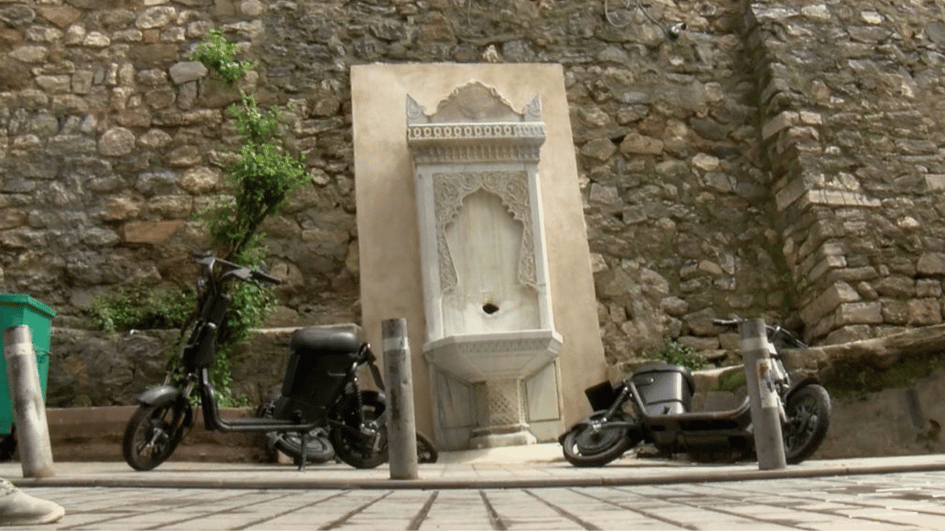Dutch court rules state liable over 300 Srebrenica victims
THE HAGUE - Agence France-Presse

A Bosnian woman looks at the Potocari Memorial Center during the funeral in Srebrenica. AA Photo
A court in the Netherlands ruled Wednesday that the Dutch state was liable for the deaths of over 300 Bosnian Muslim men and boys in the Srebrenica massacre, the worst atrocity on European soil since World War II.Families of the victims had brought a case the Dutch government over the 1995 killings, accusing Dutch UN peacekeepers of failing to protect the 8,000 slaughtered by ethnic Serb troops just a few months before the end of the Bosnian war.
The judgement was greeted with a mixture of satisfaction and dismay by relatives after the court found the state was liable for those killed after being expelled from a UN compound but not all of the deaths.
"Today we got justice for one group, that's good," said Munira Subasic, one of the representatives of the Mothers of Srebrenica group who were in court for the judgement.
"But how do you explain to a mother that the Dutch are responsible for the death of one son that stood on one side of the fence, and not for the one on the other side?" she said through tears.
"The Dutch compound was so big that everyone should have been let in the compound. We will continue to seek truth and justice."
The tiny Muslim enclave was under UN protection until July 11, 1995 when it was overrun by ethnic Serb forces under the command of Ratko Mladic, who is currently on trial on genocide and war crimes charges over the war in Bosnia, including Srebrenica.
Mladic's troops brushed aside the lightly-armed Dutch peacekeepers in a "safe area" where thousands of Muslims from surrounding villages had gathered for protection.
In the subsequent days, almost 8,000 Muslim men and boys were slaughtered and their bodies dumped in mass graves in what two international courts have ruled was genocide.
"The state is liable for the loss suffered by relatives of the men who were deported by the Bosnian Serbs from the Dutchbat (Dutch battalion) compound in Potocari in the afternoon of 13 July, 1995," judge Larissa Elwin said.
"Dutchbat should have taken into account the possibility that these men would be the victim of genocide and that it can be said with sufficient certainty that, had the Dutchbat allowed them to stay at the compound, these men would have remained alive," she ruled.
"By cooperating in the deportation of these men, Dutchbat acted unlawfully."
However, the court ruled that the state was not liable on all counts.
"Dutchbat's acts prior to the fall of Srebrenica can neither be attributed to the State, nor are they considered to be unlawful," the judge said.
"The fact that air support failed to materialise or that it was stopped, cannot be attributed to the state either, just as the fact that the enclave was not recaptured."
The Mothers of Srebrenica, representing some 6,000 widows and victims' relatives, have been seeking justice for years for the massacre, which the UN's highest International Court of Justice has ruled was genocide.
In April, the Dutch government said it would pay 20,000 euros to relatives of three Bosnian Muslim men murdered after peacekeepers expelled them from the UN compound at Srebrenica in 1995.
That move followed a Dutch court's landmark ruling last year that the state was liable for the deaths, the first time a government had been held responsible for the actions of peacekeepers operating under a UN mandate.
Lawyers for the Dutch government left the courtroom on Wednesday without commenting on the judgement.
Wednesday's ruling come just days after thousands of people gathered in Srebrenica to mark the 19th anniversary of the killings.
So far, the remains of 6,066 people have been exhumed from mass graves in the Srebrenica region for reburial.
The massacre took place just a few months before the end of Bosnia's 1992-1995 war, which claimed some 100,000 lives in total.
Both Mladic, dubbed the "Butcher of Bosnia", and Bosnian Serb wartime political leader Radovan Karadzic, considered masterminds of the massacre, are now being tried by a UN court for war crimes and genocide.
















